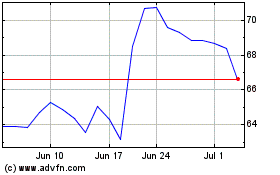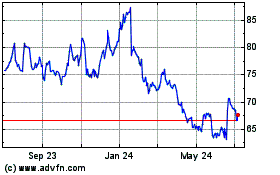UPDATE: FDA Warns Biogen On Tysabri, Gilead On Truvada Promotions
April 07 2010 - 2:31PM
Dow Jones News
The Food and Drug Administration said Wednesday that a
promotional Webcast involving the multiple sclerosis drug Tysabri
was "false or misleading" because it minimized the risk of a
serious brain infection.
Tysabri is sold jointly by Elan Corp. (ELN, ELN.DB) and Biogen
Idec Corp. (BIIB) to treat multiple sclerosis and Crohn's disease.
In a March 25 letter sent to Biogen Idec, the FDA also cited the
company for failing to submit the Webcast to the agency for review
30 days prior to using the material.
Separately, the agency cited Gilead Sciences Inc. (GILD) for a
print advertisement involving its HIV drug Truvada. In a March 26
letter to Gilead, the FDA said the advertisement was "false or
misleading" because it overstated the effectiveness of the products
and minimized the risks associated with the drug.
Both letters were posted to the FDA's Web site on Wednesday.
The FDA said a Webcast conducted by Biogen Indec last October
and November minimized the severity of the risk of developing
progressive multifocal leukoencephalopathy or PML, a brain
infection that's often fatal.
Tysabri was temporarily pulled from the market in 2005 after
three patients in clinical trials contracted PML, and two patients
died. In 2006, the FDA allowed Tysabri to return to the market with
a risk-management program.
Naomi Aoki, Biogen Idec's director of public affairs, explained
that the Webcasts were designed for doctors to discuss PML on a
section of the company's Web site accessible only to health-care
professionals.
"We believed that the content and means for communicating this
safety information was appropriate, timely, factual and
non-promotional, and we plan to have further conversation with the
agency," she said.
The Webcasts were set up after European regulators disclosed a
much higher number of PML cases than expected. Biogen Idec now
updates PML numbers on a monthly basis.
The FDA said the ad for Truvada suggests the product is "better
or more effective than has been demonstrated by substantial
evidence or substantial clinical experience." The ad shows
photographs of a woman who takes Truvada as part of her HIV
combination therapy at various stages of her life, such as at her
graduation, in an office setting reading a document and as a
married woman sitting on a sofa. In each depiction, the woman
appears to be happy and in good health.
The ad also says Truvada is proven over the long term to reduce
HIV viral load to undetectable levels and increase counts of
another type of cell involved with the body's immune system. The
FDA said such claims haven't been demonstrated by substantial
clinical evidence.
The agency also said the product "carries numerous serious,
potentially life-threatening risks and adverse reactions...that can
have a significant negative impact on a patient's life."
The FDA said Gilead needed to stop distributing the
advertisement.
In a statement, Gilead said it takes the FDA's concerns
regarding the advertisements seriously "and we will be working to
respond to the FDA promptly."
-By Jennifer Corbett Dooren, Dow Jones Newswires; 202-862-9294;
jennifer.corbett@dowjones.com
Gilead Sciences (NASDAQ:GILD)
Historical Stock Chart
From Jun 2024 to Jul 2024

Gilead Sciences (NASDAQ:GILD)
Historical Stock Chart
From Jul 2023 to Jul 2024
